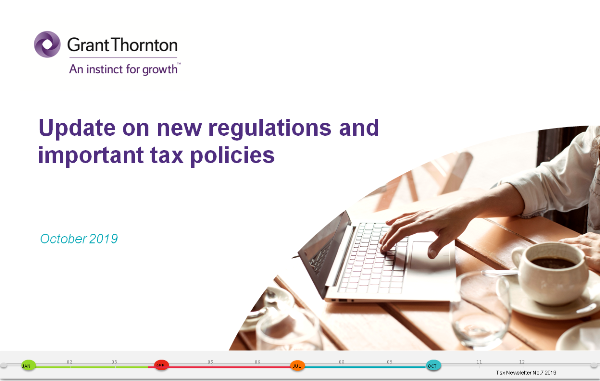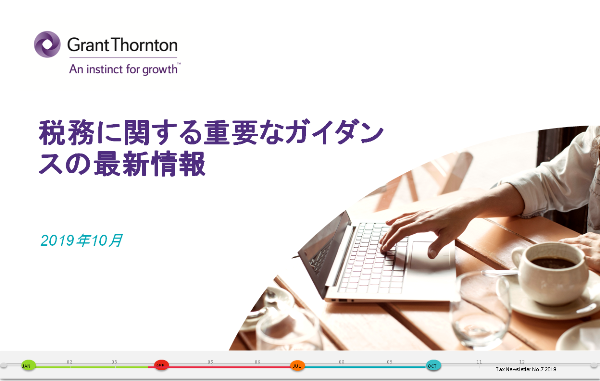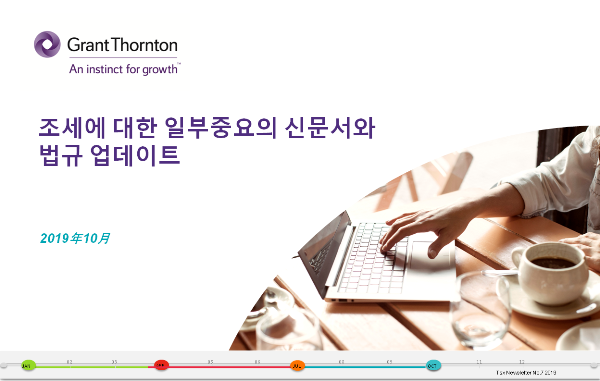1. New Circular No. 48/2019/TT-BTC on provisions
The Ministry of Finance has just issued Circular No. 48/2019/TT-BTC (“Circular 48”) on 8 August 2019, guiding the making and handling of inventories provision, investment losses, doubtful debts and warranty of products, goods, services, construction works at the enterprise. This new circular will take effect from 10 October 2019 and apply from the fiscal year 2019.
In principle, provisions are included in deductible expenses when determining taxable income for corporate income tax (CIT) in the annual reporting period to offset losses that may occur in the future; ensure that the enterprise record the value of inventories, investments not higher than the market price and the value of receivable debts not higher than the recoverable value at the time of making yearly financial statements.
Some new notable points in this Circular 48 on setting up provisions compared to previous regulations are as follows:
- Enterprises are no longer allowed to set up risk provisions for offshore investments. The balance of the provision for loss of offshore investments that the enterprise has established (if any) must be reverted, recorded as a decrease in expenses at the preparation time of the financial statements for 2019.
- Regarding the time of making and reverting the provisions, based on the previous regulations, it is the end of the annual accounting period or the last day of the fiscal year. However, this provision amended in Circular 48 and the time of making provision will be when preparing the annual financial statements.
- Regarding the allowances for stock devaluation, enterprises will be allowed to make deductions for setting up allowances for stock devaluation of goods which are outside the warehouse, such as goods in transit, consignment goods, goods stored in rented warehouses.
- In addition, the formula for calculating the level of the provision for devaluation of securities and the provision for losses of financial investments also changes compared to the previous one.
2. Are signing date and time compulsory item in e-invoices?
On 11 June 2019, the Hanoi Tax Department sent Official Letter No. 44743/CT-TTHT to the General Department of Taxation for guidance on whether the date and time of signing on the electronic invoice is required or not.
According to this Official Letter, the current proposal of the Hanoi Tax Department is that the date and time of signing are not mandatory on e-invoices as prescribed in Article 6 of Circular No. 32/2011/TT-BTC and Article 6 of Decree No. 119/2018/ND-CP. Therefore, if the entity has created electronic invoices without the date and time of signing, other indicators on the list of mandatory criteria still meet the requirements of laws on electronic invoice, those invoices are still determined as legally appropriate.
In case the company receives invoices to purchase goods and services from suppliers using electronic invoices without the date of signing electronic invoices and these electronic invoices are still compliant with the provisions of law, the entity is allowed to deduct input VAT if they meet the conditions specified in Clause 10, Article 1 of Circular No. 26/2015/ TT-BTC of 27 February 2015 of the Ministry of Finance.
However, about this issue, some local tax authorities have the opposite view that the date and time of signing is required for the e-invoice to be effective as the Official Letter 3134/CT-TTHT dated 10 May 2019 Dong Nai Tax Department and Official Letter 997/CT-TTHT dated 17 June 2019 of Bac Ninh Tax Department.
According to the draft Circular guiding Decree 119/2018/ND-CP, the time of making electronic invoices will be the time of electronic signing on invoices. Therefore, in the future, when a guiding circular is issued, based on the draft circular, the time of electronic signing will become mandatory.
Currently, because there is still no official response from the General Department of Taxation related to this issue, the local tax departments have different handling measures. Companies should take it into consideration before proceeding.
3. Foreign workers changing companies must apply for re-issuance of work permits
On 16 July 2019, the Department of Employment under the Ministry of Labor, Invalids and Social Affairs has just issued Official Letter No. 646/CVL-QLLD providing guidelines on conditions for granting work permits to foreign workers.
According to this Official Letter, if the foreign worker is transferred to work for another employer in the same position, although this worker has been granted a work permit and is still valid, he or she must apply for a reissuance of work permit. Therefore, it is understood that each Work permit is only valid for use within the scope of the applicant company.
Accordingly, the application for a work permit in this case includes the documents specified in Clauses 1, 5, 6 and 7, Article 10 of Decree No. 11/2016/ND-CP and work permit or a certified copy of the issued work permit.
4. Manufactured goods for on-site export on order, are exempt from material import duty
The General Department of Customs has just issued Official Letter No. 4138/TCHQ-TXNK dated 25 June 2019 providing unified guidelines on tax policies for raw materials and supplies imported for processing and export on-spot production on order.
According to this Official Letter, in cases where an enterprise imports raw materials or supplies for processing production of exported goods, then returns, sells processed and manufactured products to foreign traders, but is designated to deliver goods to other enterprises in Vietnam (on-spot export), they are exempt from import tax on the raw materials and supplies already imported for processing or producing goods which were exported on the spot.
Regarding the instruction of manufactured for on-spot export goods according to designation, the General Department of Customs has issued Official Letter No. 5826/TCHQ-TXNK. In which, according to Point 2 of this Official Letter, on-spot exported goods which are manufactured by Vietnamese enterprises for foreign traders but designated to deliver products in Vietnam, are not exempt or refunded with import tax. The newly issued Official Letter No. 4138/TCHQ-TXNK replaces this content in the previous Official Letter No. 5826/TCHQ-TXNK dated 5 October 2018.
5. Customs inspection of norm for manufacturing export goods and processed goods
On 3 June 2019, the General Department of Customs has just issued Official Letter No. 3600/TCHQ-KTSTQ on checking actual norm and time of deciding inventory’s ending balance at enterprises subject to the registration and declaration of norm for manufactured for export and processed goods.
According to this Official Letter, the General Department of Customs provides guidance for provinces to check the actual norm of for manufactured for export and processed goods. Specifically, the implementation of making norm for manufactured for export and processed goods is not based on the average norm to check production one because it will lead to inaccurate results compared to the actual production of enterprises. Instead, the actual norm check must be based on the examination of vouchers/documents and data related to the actual quota determination such as production orders, production plans, internal transfer bill ... of each order.
During the post-customs clearance check/inspection process at the office of the declarant, the customs authority may request the enterprise to provide and present vouchers/documents and data stored for inspection, compared to actual production according to each production plan by week / month / year depending on specific characteristics, management scale and industry.
Also in this Official Letter, the General Department of Customs provides guidance on the time of the warehouse inspection to carry out post-clearance check/inspection. Accordingly, the time of checking warehouse inventory must be determined on a case-by-case basis, based on the actual inventory management of each enterprise. For enterprises that have periodical count of inventory and keep adequate inventory counting records and documents, the time closing inventory balance is determined at the time of inventory count of the enterprises.
In contrast, for enterprises that do not conduct periodic count of inventory (or do not cooperate in providing records and documents during the inspection process), the Customs authorities will count the actual inventory within the time of post-clearance inspection and decide inventory closing balance time based on the results of information collection, risk level and inventory management characteristics of each enterprise.
6. Guidance on treatment of interest expenses exceeding 20% of EBITDA under Decree 20 for fiscal year ended 2017
The General Department of Taxation has just issued an Official Letter No. 3000/TCT-DNL dated 1 August 2019, answering the Hanoi Tax Department on the application of Decree 20/2017/ND-CP on interest expenses of enterprises whose related transactions arise, specifically as follows:
- Apply the regulations on interest expenses incurred from 1 May 2017 until the end of the fiscal year, regardless of whether the loan contracts were signed before or after 1 May 2017.
- If the taxpayer can separately account their business results from 1 May 2017 to the end of the fiscal year, the elements used to calculate “Earnings before interest, taxes, depreciation and amortization during the period” are determined based on the actually incurred figures;
- In case the taxpayer cannot separately account their business results from 1 May 2017 to the end of the fiscal year, the elements used to calculate “Earnings before interest, taxes, depreciation and amortization during the period” are allocated in proportion to the remaining months of the fiscal year from 1 May 2017.
Please contact the Grant Thornton consultants in case you need more professional advice regarding to the application of tax, accounting, transfer pricing, labor policies, investment and customs as well as other legal policy problems in the business process of enterprises.




